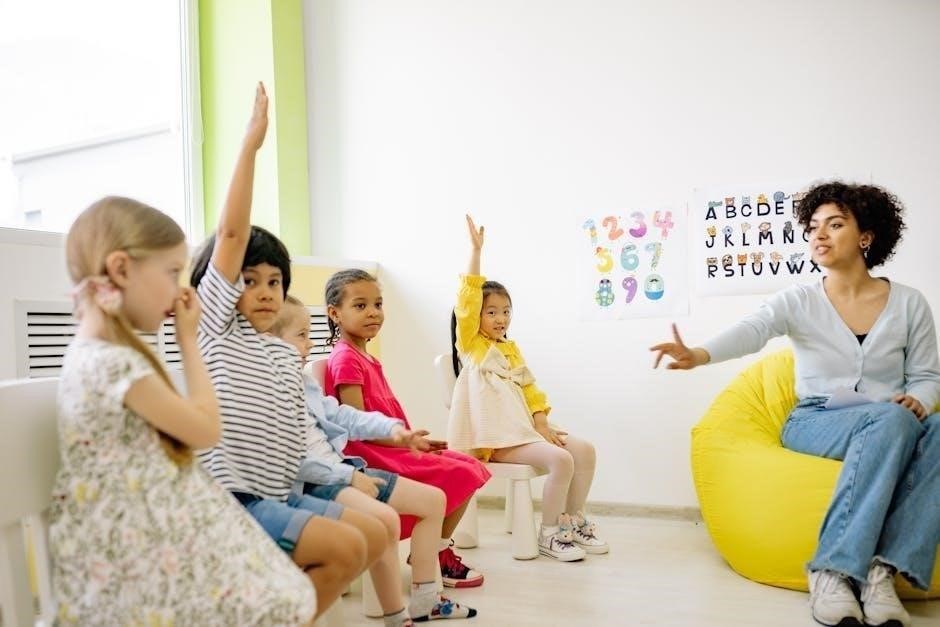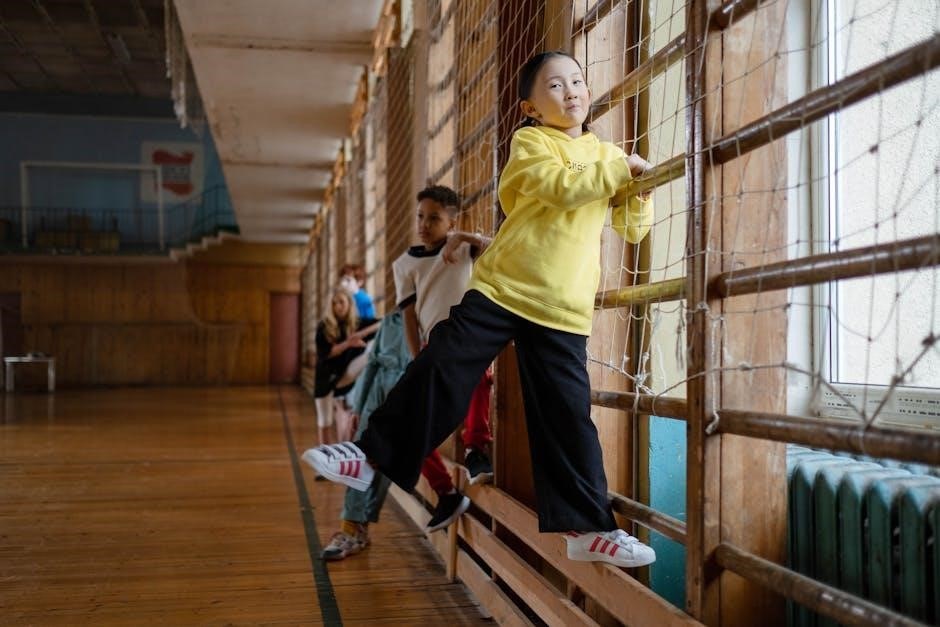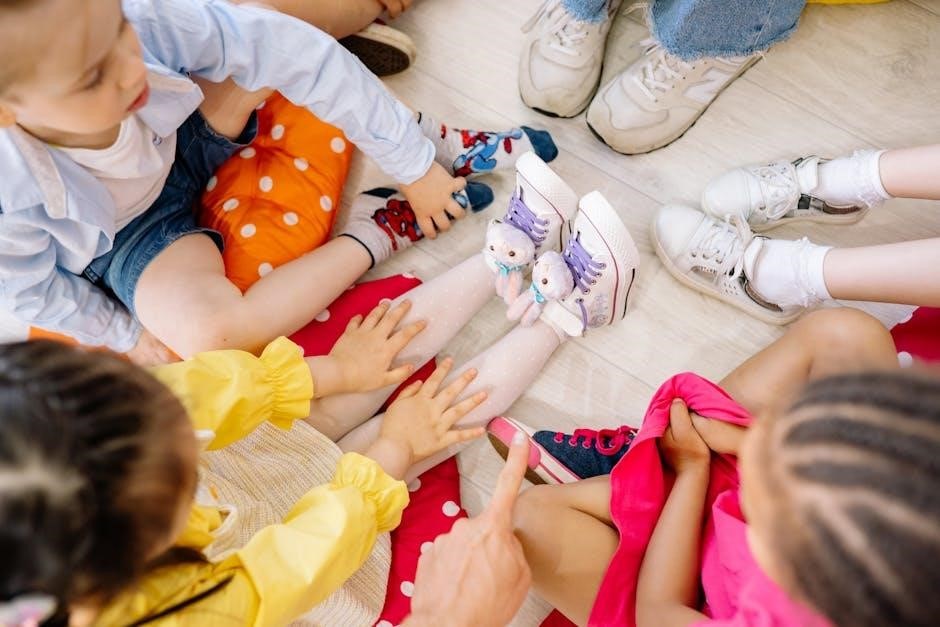Role-play is a dynamic tool in ESL education, bridging the gap between theory and practical language use. By simulating real-life scenarios, students engage in interactive learning, building confidence and fluency in English.
Why Role-Play Is Effective for English Language Learners
Role-play is a powerful educational tool that immerses ESL learners in real-life scenarios, fostering practical language application. It enhances speaking, listening, and problem-solving skills while promoting teamwork and creativity. Learners gain confidence by practicing interactions in a low-stakes environment. Role-play also encourages active participation and immediate feedback, refining communication and cultural understanding. Its interactive nature makes learning engaging, helping students connect theory with practice and preparing them for authentic situations. By simulating diverse contexts, role-play bridges the gap between classroom learning and real-world application, making it an indispensable method for ESL instruction.
Common Role-Play Scenarios for Students
Role-play scenarios often include job interviews, business negotiations, and telephone conversations, preparing learners for professional and everyday interactions. These activities mirror real-life challenges, enhancing practical communication skills effectively.
Everyday Situations: Restaurant Interactions, Shopping, and Making Reservations
Everyday situations like dining at a restaurant, shopping at the mall, and making reservations are popular role-play topics for ESL students. These scenarios simulate real-life interactions, helping learners practice essential communication skills. For example, restaurant role-plays involve ordering food, asking for recommendations, and handling payments, while shopping scenarios focus on bargaining, comparing prices, and making purchases. Making reservations, whether for hotels or events, teaches students to provide and confirm details effectively. These activities are engaging and relevant, allowing students to apply language in practical contexts. By practicing these interactions, students build confidence in using English for everyday tasks, making them more prepared for real-world encounters. These role-plays also encourage collaboration and creativity, as students take on different roles and adapt to unexpected situations. Such exercises are invaluable for developing fluency and accuracy in spoken English.

Professional Scenarios: Job Interviews and Business Negotiations
Professional role-play scenarios, such as job interviews and business negotiations, are essential for ESL learners aiming to succeed in workplace environments. These activities simulate real-world professional interactions, allowing students to practice articulating their qualifications, discussing salary expectations, and presenting ideas confidently. In job interviews, students learn to respond to common questions and showcase their skills effectively. Business negotiations, on the other hand, focus on reaching mutually beneficial agreements, emphasizing active listening and persuasive communication. These exercises not only enhance speaking skills but also familiarize students with professional etiquette and terminology. By engaging in such role-plays, learners gain the confidence to navigate real job interviews and business meetings, making them more competitive in the global job market. These scenarios are tailored to prepare students for the challenges of professional communication in English.
Skills Developed Through Role-Play Activities
Role-play enhances speaking, communication, and problem-solving skills, fostering teamwork and creativity. It builds confidence, improves fluency, and refines pronunciation, preparing learners for real-life interactions and cultural awareness in diverse contexts.

Improving Speaking and Communication Skills
Role-play activities are instrumental in enhancing speaking and communication skills among ESL learners. By immersing students in real-life scenarios, such as restaurant interactions or shopping, they practice articulating thoughts clearly and responding spontaneously. These exercises foster natural dialogue, helping learners refine pronunciation, intonation, and vocabulary use. Engaging in conversations with peers in a supportive environment builds confidence and reduces language anxiety. Role-play also encourages active listening and adaptability, as students navigate unpredictable interactions. Over time, these activities lead to improved fluency and the ability to express ideas effectively in diverse contexts. The immediate feedback received during role-play further accelerates progress, allowing learners to refine their communication strategies and develop a more authentic command of English.
Enhancing Problem-Solving and Teamwork Abilities
Role-play activities are highly effective in fostering problem-solving and teamwork skills among ESL learners. Scenarios such as group role-play exercises like “Blackout” or “The Wedding Party” require students to collaborate, share ideas, and navigate challenges collectively. These activities simulate real-life situations where effective communication and adaptability are crucial. By working together to achieve a common goal, students develop critical thinking and learn to approach problems creatively. Teamwork exercises also encourage active participation, fostering a sense of responsibility and mutual support. As students engage in these collaborative tasks, they refine their ability to express opinions, listen to others, and compromise, all while practicing English. This dual focus on language acquisition and interpersonal skills prepares learners for practical, real-world applications of their abilities.

Interactive Role-Play Activities for the Classroom
Interactive role-play activities like “Blackout” and “The Wedding Party” engage students in dynamic, immersive learning experiences. These exercises encourage creativity, collaboration, and practical English use in a structured, enjoyable format.
Group Role-Play: Blackout, Wedding Party, and Teamwork Exercises

Group role-play activities such as Blackout and The Wedding Party are engaging ways to foster teamwork and communication. In Blackout, students collaborate to solve problems in a simulated power outage, enhancing their ability to think critically and work together. The Wedding Party scenario involves students playing roles like bride, groom, or guests, practicing social interactions and dialogue in a festive setting. These exercises encourage creativity and spontaneity while refining language skills. Teamwork exercises, such as planning an event or resolving conflicts, further develop problem-solving abilities. By participating in these activities, students build confidence, improve fluency, and gain practical experience in real-life situations. These dynamic group role-plays make learning English enjoyable and effective, preparing students for diverse social and professional contexts.

Pair Work: Practicing Directions, Personal Information, and Social Interactions
Pair work role-plays are ideal for focusing on specific communication skills. Students practice giving and asking for directions, exchanging personal information, and engaging in social interactions. These activities encourage meaningful conversations, helping learners develop clarity and accuracy in their speech. For example, one student might act as a tourist while the other provides directions to local landmarks. Exchanging personal details, such as hobbies or weekend plans, fosters natural dialogue. Social interactions, like making plans or discussing opinions, enhance fluency and cultural understanding. Pair work allows for personalized practice, ensuring each student receives focused attention. By simulating real-life conversations, these exercises build confidence and prepare students for practical situations outside the classroom, making language learning both effective and enjoyable.

Implementing Role-Play in Teaching Practices
Role-play activities are most effective when paired with constructive feedback, encouraging student participation, and connecting scenarios to real-life situations. This approach ensures practical application and sustained engagement in language learning.
Providing Feedback and Encouraging Student Participation

Effective role-play activities thrive on immediate, constructive feedback, allowing students to refine their communication skills. Encouraging participation ensures all learners engage actively, fostering confidence and collaboration. Teachers should guide students through scenarios, offering insights and fostering a supportive environment. Research emphasizes the importance of feedback in developing social and emotional skills, as students apply these abilities in real-life interactions. While role-play should not be overused to avoid tedium, its strategic implementation enhances practical language application. In group settings, facilitators can solicit input, making feedback a collective learning experience. This approach ensures role-play remains dynamic, preparing students for authentic situations while strengthening their interpersonal and language abilities.

Real-Life Applications: Preparing Students for Practical Situations

Role-play activities are designed to mirror real-life encounters, equipping students with practical language skills for everyday interactions. Scenarios like dining out, shopping, and job interviews simulate authentic experiences, helping learners navigate similar situations confidently. By practicing these tasks, students develop the ability to communicate effectively in diverse contexts, from casual conversations to professional settings. This approach not only enhances language proficiency but also builds problem-solving abilities and social skills. The use of cue words and clear formats in role-play activities ensures students understand expectations, making it easier to apply their learning in real-world settings. This method prepares students to handle practical challenges, fostering independence and readiness for real-life interactions.

Be First to Comment